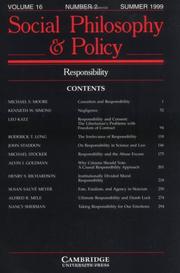| Listing 1 - 10 of 257 | << page >> |
Sort by
|
Book
ISBN: 1640951059 9781640951051 9781640951044 Year: 2019 Publisher: Sound Wisdom
Abstract | Keywords | Export | Availability | Bookmark
 Loading...
Loading...Choose an application
- Reference Manager
- EndNote
- RefWorks (Direct export to RefWorks)
"In order to create a truly meaningful life, we must first accept that the problem is never other people. "The real problem," Sam Silverstein maintains, "is what we believe about other people." Silverstein's new book shows why everything we have been taught about accountability is wrong. Contrary to popular belief, accountability is not a way of doing. Accountability is a way of thinking. It is how we think about ourselves and others. And it is the highest form of leadership. The secret to creating accountable relationships, and elevating the personal benchmark that Silverstein calls the The Accountability Index, lies in making ten critical choices that support an accountable mindset. I Am Accountable offers a comprehensive plan to help you establish and leverage that mindset, deepen commitments, create lasting meaning in your life and relationships, transform the culture within your organization, and foster positive change in the larger community"--
Responsibility. --- Accountability --- Moral responsibility --- Obligation --- Ethics --- Supererogation
Book
ISBN: 9789264078680 Year: 1999 Publisher: Paris : OECD Publishing,
Abstract | Keywords | Export | Availability | Bookmark
 Loading...
Loading...Choose an application
- Reference Manager
- EndNote
- RefWorks (Direct export to RefWorks)
This document defines the roles and responsibilities of the Study Director in Good Laboratory Practice studies.
Duty --- Responsibility --- Accountability --- Moral responsibility --- Obligation --- Ethics --- Supererogation --- Deontology
Book
ISBN: 3825309150 Year: 1999 Publisher: Heidelberg Winter
Abstract | Keywords | Export | Availability | Bookmark
 Loading...
Loading...Choose an application
- Reference Manager
- EndNote
- RefWorks (Direct export to RefWorks)
Ethics, Modern --- Responsibility. --- Responsibility --- Accountability --- Moral responsibility --- Obligation --- Ethics --- Supererogation
Book
ISBN: 0262327406 0262327414 9780262327404 0262028166 9780262028165 132247494X 9781322474946 9780262327411 Year: 2014 Publisher: Cambridge, Massachusetts : MIT Press,
Abstract | Keywords | Export | Availability | Bookmark
 Loading...
Loading...Choose an application
- Reference Manager
- EndNote
- RefWorks (Direct export to RefWorks)
"The philosophical commitment to moral responsibility seems unshakable. But, argues Bruce Waller, the philosophical belief in moral responsibility is much stronger than the philosophical arguments in favor of it. Philosophers have tried to make sense of moral responsibility for centuries, with mixed results. Most contemporary philosophers insist that even conclusive proof of determinism would not and should not result in doubts about moral responsibility. Many embrace compatibilist views, and propose an amazing variety of competing compatibilist arguments for saving moral responsibility. In this provocative book, Waller examines the stubborn philosophical belief in moral responsibility, surveying the philosophical arguments for it but focusing on the system that supports these arguments: powerful social and psychological factors that hold the belief in moral responsibility firmly in place. Waller argues that belief in moral responsibility is not isolated but rather is a central element of a larger belief system; doubting or rejecting moral responsibility will involve major adjustments elsewhere in a wide range of beliefs and values. Belief in moral responsibility is one strand of a complex and closely woven fabric of belief, comprising threads from biology, psychology, social institutions, criminal justice, religion, and philosophy. These dense interconnections, Waller contends, make it very difficult to challenge the belief in moral responsibility at the center. They not only influence the philosophical arguments in favor of moral responsibility but also add powerful extraphilosophical support for it"--Publisher's description.
Responsibility. --- Accountability --- Moral responsibility --- Obligation --- Ethics --- Supererogation --- PHILOSOPHY/General
Book
ISBN: 9780199695324 0199695326 0191752215 0191655791 1283979322 1283978733 Year: 2013 Publisher: Oxford Oxford university press
Abstract | Keywords | Export | Availability | Bookmark
 Loading...
Loading...Choose an application
- Reference Manager
- EndNote
- RefWorks (Direct export to RefWorks)
This book explores moral responsibility, and whether it is compatible with causal determinism. Its author, K. E. Boxer, started out with deeply incompatibilist intuitions but became dissatisfied with the arguments that she and other contemporary incompatibilists marshalled in support of this view. Rethinking Responsibility has evolved out of her search for a more adequate argument. Boxer suggests that if incompatibilists are to be in a position to provide such an argument, they must shift their attention away from metaphysics and back to what H. L. A. Hart deemed the primary sense of the concept of moral responsibility, viz., the sense of liability. To say that an agent is morally responsible for an action in this sense is to say that she satisfies the necessary causal and capacity conditions for desert of certain forms of response. If incompatibilists are to show that among those conditions is a requirement for some form of ultimate responsibility incompatible with determinism, they must first clarify their understanding of moral desert and the moral responses associated with attributions of responsibility. The book examines different possible understandings of moral liability-responsibility based on different possible accounts of the nature of moral blame, the moral desert of punishment, and the relation between desert of moral blame and desert of punishment. A focal point throughout the discussion is whether, on any of the possible understandings, moral responsibility would require agents to be ultimately responsible for their actions in a way incompatible with causal determinism. Other issues discussed include what renders a defect a moral defect or a particular criticism a moral criticism, whether moral obligations are act-governing or will-governing, the connection between the moral reactive attitudes and the retributive sentiments, the relevance of the capacity to participate in ordinary interpersonal relationships, and whether it is possible to understand the moral desert of punishment in communicative terms. Boxer concludes that incompatibilists face an unenviable choice: either they must adopt an understanding of the moral desert of punishment that many find morally problematic, or they must abandon incompatibilism.
Responsibility --- Determinism (Philosophy) --- Accountability --- Moral responsibility --- Obligation --- Ethics --- Supererogation --- Philosophy

ISBN: 0710004486 Year: 1980 Publisher: London Routledge and Kegan Paul
Abstract | Keywords | Export | Availability | Bookmark
 Loading...
Loading...Choose an application
- Reference Manager
- EndNote
- RefWorks (Direct export to RefWorks)
Violence --- Responsibility --- Responsabilité --- Violent behavior --- Social psychology --- Accountability --- Moral responsibility --- Obligation --- Ethics --- Supererogation --- Responsibility. --- Violence. --- Responsabilité
Book
ISBN: 0691071705 Year: 1970 Publisher: Princeton (N.J.): Princeton university press
Abstract | Keywords | Export | Availability | Bookmark
 Loading...
Loading...Choose an application
- Reference Manager
- EndNote
- RefWorks (Direct export to RefWorks)
Responsibility --- -Accountability --- Moral responsibility --- Obligation --- Ethics --- Supererogation --- Addresses, essays, lectures --- Responsibility. --- -Addresses, essays, lectures --- Accountability

ISBN: 0521654505 0511524102 Year: 1999 Publisher: Cambridge : Cambridge University Press,
Abstract | Keywords | Export | Availability | Bookmark
 Loading...
Loading...Choose an application
- Reference Manager
- EndNote
- RefWorks (Direct export to RefWorks)
The essays in this volume address questions about responsibility that arise in moral philosophy and legal theory. Some analyse different theories of causality, asking which theory offers the best account of human agency and the most satisfactory resolution of troubling controversies about free will and determinism. Some essays look at responsibility in the legal realm, seeking to determine how the law should assign liability for negligence, or whether the courts should allow defendants to offer excuses for their wrongdoing or to claim some form of 'diminished responsibility'. Other essays explore libertarian views about political freedom and accountability, asking whether libertarian positions on consent, contract law, and responsibility are consistent, or whether restitution is superior to retribution or deterrence as a basis for a theory of corrective justice. Still others examine the notion of partial or divided responsibility, or the relationship between responsibility and the emotions.
Responsibility. --- Responsabilité --- Arts and Humanities --- Philosophy --- Accountability --- Moral responsibility --- Obligation --- Ethics --- Supererogation
Book
ISBN: 0198822766 0191792845 0191506559 0199683646 1336015535 9780191506550 9781336015531 9780191792847 9780199683642 Year: 2015 Publisher: Oxford : Oxford University Press,
Abstract | Keywords | Export | Availability | Bookmark
 Loading...
Loading...Choose an application
- Reference Manager
- EndNote
- RefWorks (Direct export to RefWorks)
Doing harm seems much harder to justify than merely allowing harm. If a boulder is rushing towards Bob, you may refuse to save Bob's life by driving your car into the path of the boulder if doing so would cost you your own life. You may not push the boulder towards Bob to save your own life. This principle--the Doctrine of Doing and Allowing--requires defence. Does the distinction between doing and allowing fall apart under scrutiny? When lives are at stake, how canit matter whether harm is done or allowed? Drawing on detailed analysis of the distinction between doing and allowing, Fiona Wooll
Responsibility. --- Applied ethics. --- Practical ethics --- Ethics --- Casuistry --- Ethical problems --- Accountability --- Moral responsibility --- Obligation --- Supererogation
Book
ISBN: 9782251450650 2251450653 Year: 2020 Publisher: Paris : Belles lettres,
Abstract | Keywords | Export | Availability | Bookmark
 Loading...
Loading...Choose an application
- Reference Manager
- EndNote
- RefWorks (Direct export to RefWorks)
Si à présent tout le monde et en tous domaines en appelle à « la responsabilité », c'est en demeurant dans un flou artistique, et sans que cela se traduise dans la réalité sociale puisque prévaut toujours plus une irresponsabilité massive. En contre-feu aux processus de déresponsabilisation institutionnelle et idéologique (culture de l'excuse, maternage infantilisant, vulgate déterministe des neurosciences et du sociologisme, bientôt emprise de l'Intelligence artificielle) qui sapent en son amont et son aval le ressort personnel du choix responsable, cet ouvrage entend promouvoir une robuste philosophie de la responsabilité individuelle (d'Aristote et Kant à Karl Popper et Jankélévitch) sans la logique et l'éthique de laquelle le principe de responsabilité est moralement et intellectuellement privé de son sens authentique et de toute efficience. Contre le réductionnisme scientiste et « naturaliste » qui prive la responsabilité d'assise substantielle, cette réflexion réaffirme aussi la validité de l'autonomie du sujet et de son libre arbitre ressourcé dans les travaux d'une nouvelle génération de philosophes américains et désormais français ainsi que de neuroscientifiques dépourvus d'à priori déterministes. Tout en faisant litière des lieux communs voulant que la responsabilité soit le « revers de la liberté » et en soutenant que souvent nous sommes responsables de notre irresponsabilité ou que trop de responsabilités tue la responsabilité, l'auteur plaide pour une responsabilisation personnelle moins culpabilisante qu'attractive et « proactive », récompensant des individus fiers de répondre d'eux-mêmes et d'ainsi inspirer confiance aux autres - et pilier régulateur du lien social d'une véritable société ouverte.
Responsabilité --- Responsibility --- Accountability --- Moral responsibility --- Obligation --- Responsibility. --- Free will and determinism.
| Listing 1 - 10 of 257 | << page >> |
Sort by
|

 Search
Search Feedback
Feedback About
About Help
Help News
News